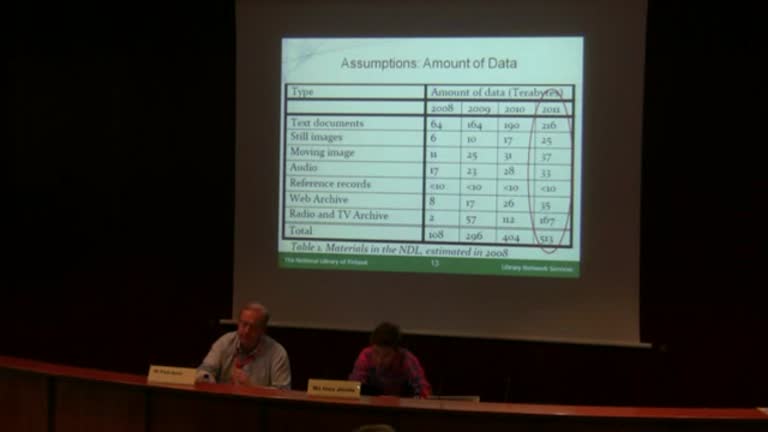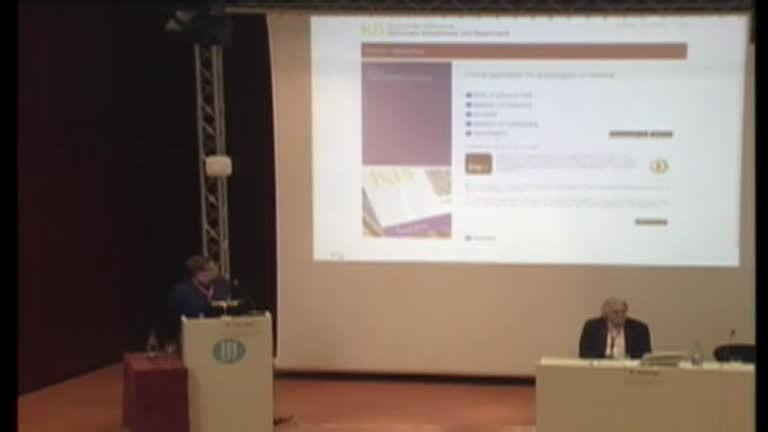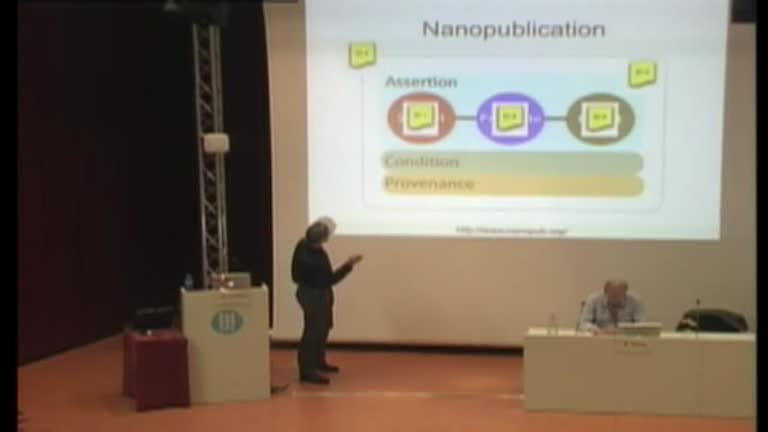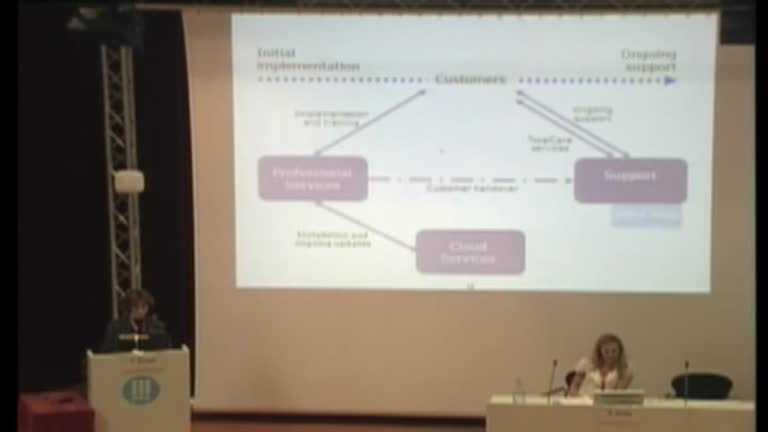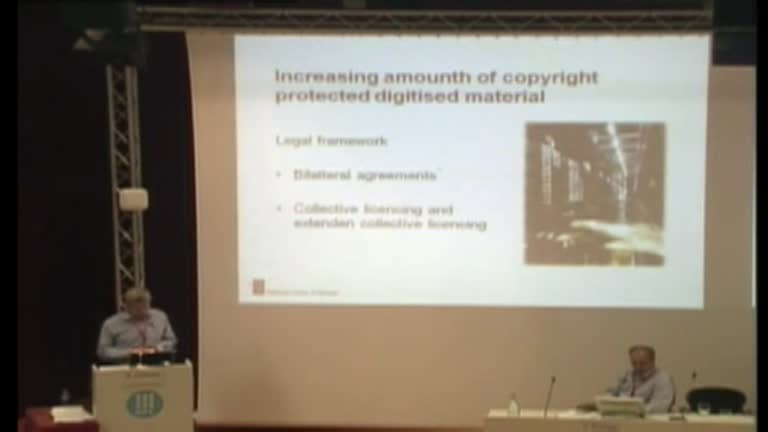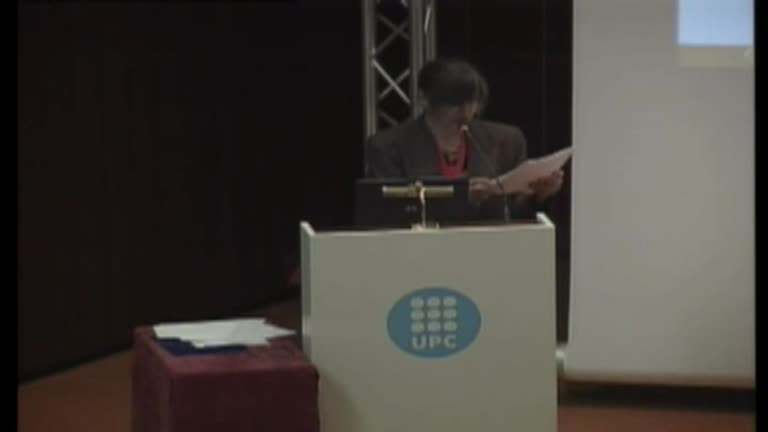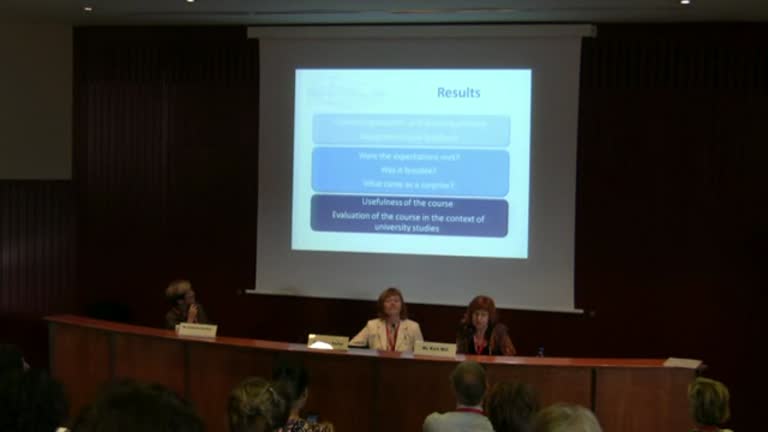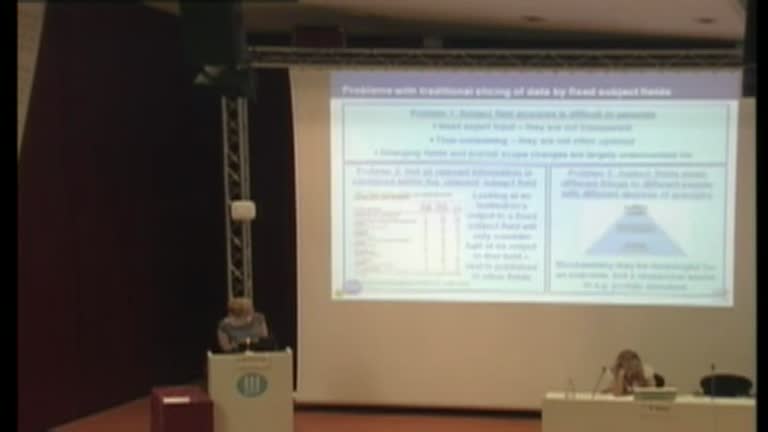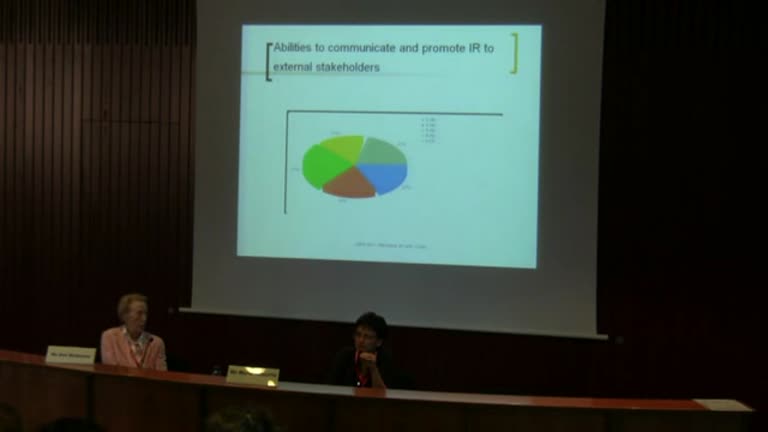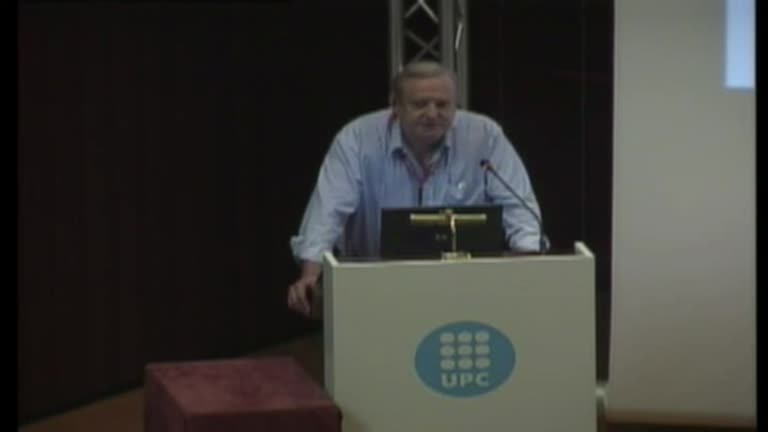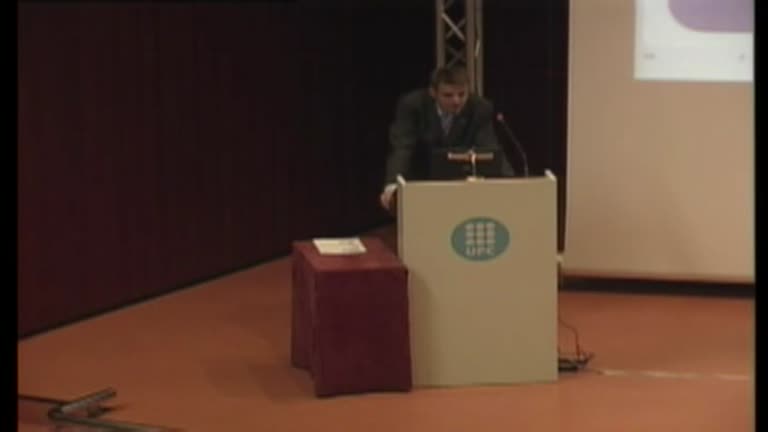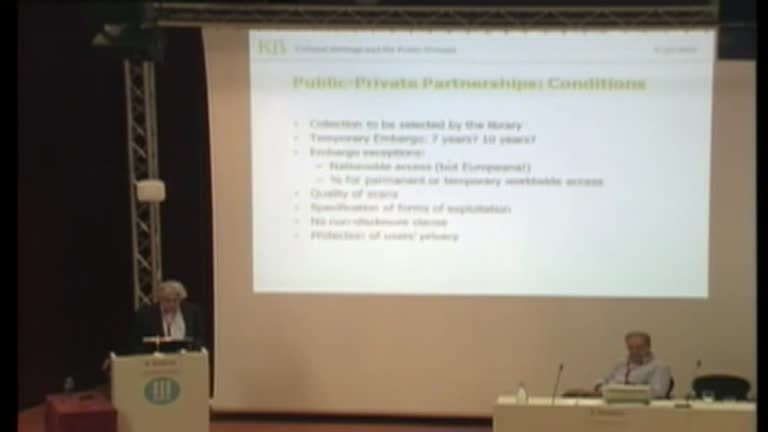Objectes multimèdia amb l’etiqueta: Servei de Biblioteques, Publicacions i Arxius
Resultats de la cerca
Costs and benefits of a shared digital long-term preservation system
Accés obert
1 de jul. 2011
This paper is a report on the cost-benefit analysis of digital long-term preservation that was conducted as a part of the National Digital Library Project in 2010.
The analysis was based on the assumption that a large number, perhaps as many as 200, of archives, libraries, and museums will share a preservation system. The term ”system” shall be understood as encompassing not only information technology, but also people, organizational structures, policies and funding mechanisms.
The cost analysis shows that a preservation system will incur, over 12 first years, cumulative costs of 42 million euros. If a dark archive will be built, the costs will increase by 3.4 million euros. Human resources and investments on information technology are the major cost factors. After the initial stages, the analysis predicts annual costs of circa 4 million euros.
The analysis was based on the assumption that a large number, perhaps as many as 200, of archives, libraries, and museums will share a preservation system. The term ”system” shall be understood as encompassing not only information technology, but also people, organizational structures, policies and funding mechanisms.
The cost analysis shows that a preservation system will incur, over 12 first years, cumulative costs of 42 million euros. If a dark archive will be built, the costs will increase by 3.4 million euros. Human resources and investments on information technology are the major cost factors. After the initial stages, the analysis predicts annual costs of circa 4 million euros.
An integral approach to digital information delivery in The Netherlands
Accés obert
1 de jul. 2011
The Koninklijke Bibliotheek (KB)’s mission is to connect people and information. One of its core responsibilities is to deliver digital scientific information to end-users, focusing on on-line access and services.
A significant number of documents, however, is only available to specific user groups (e.g. library members, students or researchers), or only remotely accessible by paying a fee.
This paper will discuss an approach to delivering information that focuses on creating on-line access to relevant scientific information to remote end-users. This integral vision is currently realized in two pilot projects, in cooperation with Dutch public libraries, research institutes and publishers.
A significant number of documents, however, is only available to specific user groups (e.g. library members, students or researchers), or only remotely accessible by paying a fee.
This paper will discuss an approach to delivering information that focuses on creating on-line access to relevant scientific information to remote end-users. This integral vision is currently realized in two pilot projects, in cooperation with Dutch public libraries, research institutes and publishers.
Towards machine-actionable scholarly communication
Accés obert
30 de juny 2011
Ever since their emergence, both the products of scholarly communication and the supporting services have mainly targeted human users. Gradually, however, products are emerging that are more friendly for use by machines, or are even solely designed for them. The emergence of a machine-actionable layer of scholarly communication happens at different levels, and touches upon primary research results, research data, and the research process itself.
The presentation will provide an insight in this ongoing evolution, and will provide concrete illustrations of this trend. It will also zoom in on research data as a new first class objects in digital scholarly communication, some of the challenges related to fully integrating this newcomer, and opportunities and challenges for libraries with this regard.
The presentation will provide an insight in this ongoing evolution, and will provide concrete illustrations of this trend. It will also zoom in on research data as a new first class objects in digital scholarly communication, some of the challenges related to fully integrating this newcomer, and opportunities and challenges for libraries with this regard.
The transition to cloud-based library services - a vendor’s perspective
Accés obert
30 de juny 2011
Recent global changes, such as technological advances, evolving needs of students and researchers, and extensive budget cuts, are driving libraries to explore new operating models and to consider the benefits of hosted services of various kinds. As a vendor of library software for two and a half decades, Ex Libris has been anticipating the changes and building an infrastructure to support new, hosted modes of operation.
New business models and legal framework for dissemination of digital content
Accés obert
30 de juny 2011
The Norwegian National Library made a decision in 2005 to digitize all of it´s collection. Being a multimedia legal deposit institution the decision implies digitizing printed material, manuscripts, music, film, photos, radio broadcasts and television. A long term schedule for the total operation was presented to the owner, The Ministry of Culture in 2006.
Managing research information for researchers and universities
Accés obert
30 de juny 2011
Recent research on scholarly behavior converges on conclusions about ecologies of information-related services in universities and across academic disciplines. In the past few years, numerous credible studies - conducted in Europe and North America - have offered evidence about information needs of a variety of researchers and their universities. While we have witnessed simultaneous evolution of discipline-based hubs and institution-based repositories, diverse international reports have identified gaps in digital infrastructure and library provision of services to manage research information.
How to teach information literacy relevant to students: an online credit course model from the University of Tartu Library
Accés obert
30 de juny 2011
To communicate the necessity of information literacy in the university and to draw attention to it as a possible subject, we created in 2006 a web-based general course model of information literacy. The course is based on the ALA standards and is now included in the university curriculum as a credit bearing optional elective course, giving 3 ECTS credit points. We relied on experiences described in professional literature: information literacy can be effectively taught in separate courses, and such courses should be offered by libraries as well. On the basis of the course, we have also created an advanced course for doctoral students, several specialized courses in information literacy integrated into subjects, and a nationwide course for gymnasium students.
How to assess the influence of research - translating user feedback into tools
Accés obert
30 de juny 2011
How influential is scholarly communication? This is a question increasingly asked of librarians in the face of higher expectations around the availability and rapid provision of relevant data. These questions have traditionally been addressed by document output counts and the Impact Factors of journals that have been published in; while this is certainly useful to a degree, concern has been expressed about basing decisions on such limited metrics that apply to varying degrees to distinct fields and career stages.
Fostering new roles for librarians. Skills set for repository managers: results of a survey in Italy
Accés obert
30 de juny 2011
The open access movement in scholarly communication has considerably grown over the last ten years, and has subsequently driven an increase in the establishment of institutional repositories (IRs). This change led to develop and to define new professional roles and skills for the IRs’ effective management.
Traditionally, metadata curation has been regarded as a strategic element for repositories and therefore the library and information community has taken up the management of these digital archives. However, it has become clear that traditional librarian professional skills, such as metadata expertise and curation, leave now the way to a richer set of skills such as management and communication skills, technical skills as well as expertise on access rights and on preserving digital content.
Traditionally, metadata curation has been regarded as a strategic element for repositories and therefore the library and information community has taken up the management of these digital archives. However, it has become clear that traditional librarian professional skills, such as metadata expertise and curation, leave now the way to a richer set of skills such as management and communication skills, technical skills as well as expertise on access rights and on preserving digital content.
Establishing the library landscape in Europe: LIBER's portfolio of EU projects
Accés obert
30 de juny 2011
LIBER's strategy (at http://www.libereurope.eu/node/59) has established Key Performance Areas for LIBER to add value to the library and information services available to European researchers. The five key Performance Areas are: Scholarly Communication, Digitisation and Resource Discovery, Heritage Collections and Preservation, Organisation and Human Resources, and LIBER Services.
Establishing a research information system as part of an integrated approach to information management: best practice at the Karlsruhe Institute of Technology (KIT)
Accés obert
30 de juny 2011
The Karlsruhe Institute of Technology (KIT) is one of the largest research and higher education organisations in the world focusing on engineering and natural sciences.
At present KIT, under the chairmanship of its executive board, is installing an extensive current research information system (CRIS) covering all institutes and facilities of the organization.
This project is based on the fact that a consistent overview on research performance has become fundamental for the international competition of research institutions and is increasingly important for strategic decisions on the executive level.
At present KIT, under the chairmanship of its executive board, is installing an extensive current research information system (CRIS) covering all institutes and facilities of the organization.
This project is based on the fact that a consistent overview on research performance has become fundamental for the international competition of research institutions and is increasingly important for strategic decisions on the executive level.
Cultural heritage and the public domain
Accés obert
30 de juny 2011
The recent report of the “Comité des Sages” recommends that “cultural institutions should make public domain material digitised with public funding as widely available as possible for access and re-use”. One of the objectives of the Berlin Declaration on Open Access to Knowledge in the Sciences and Humanities is "encouraging the holders of cultural heritage to support open access by providing their resources on the Internet".


